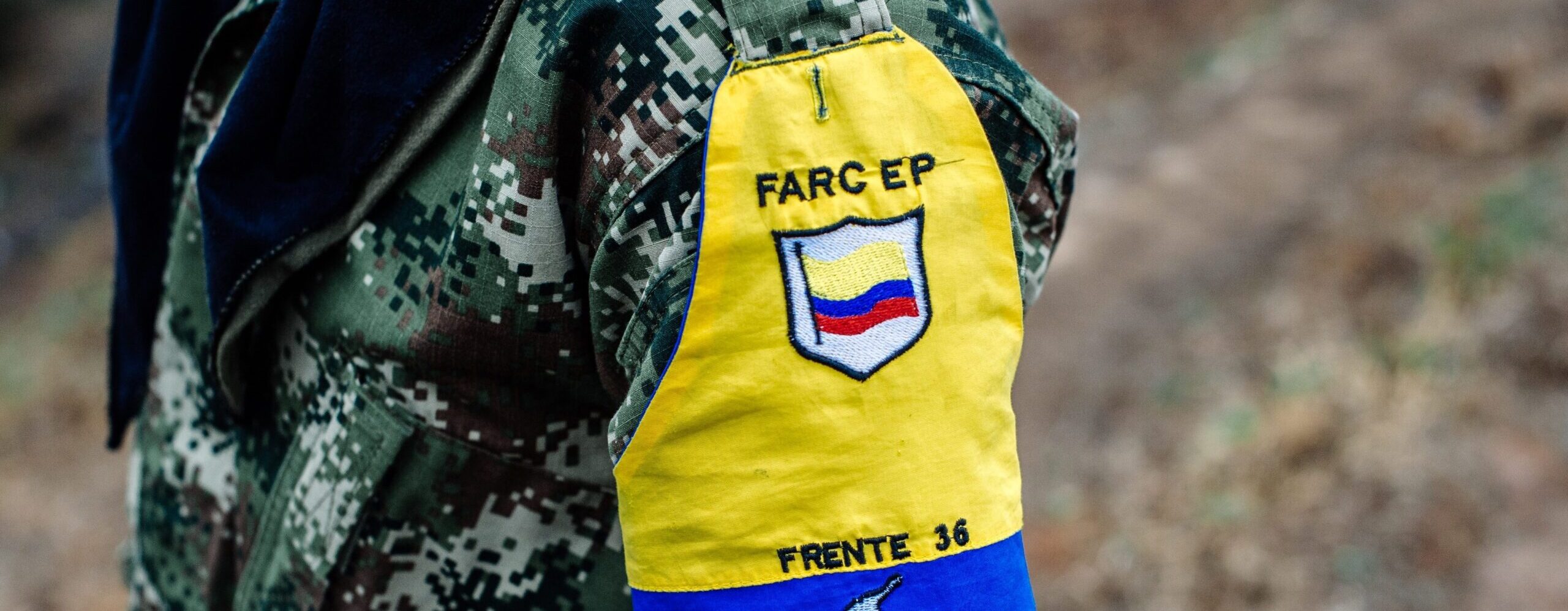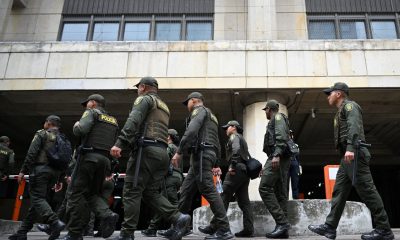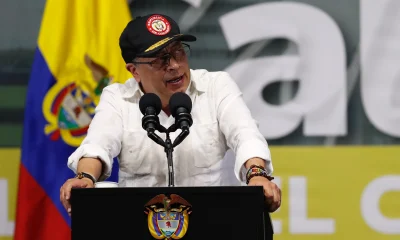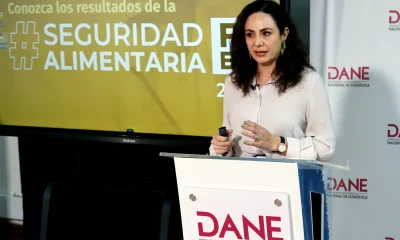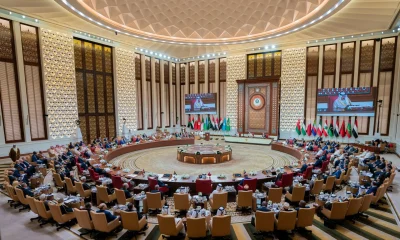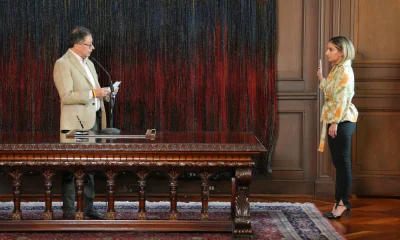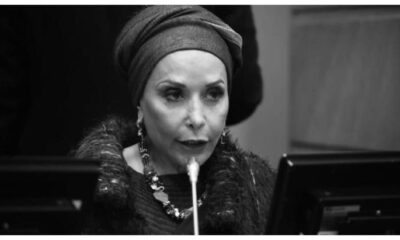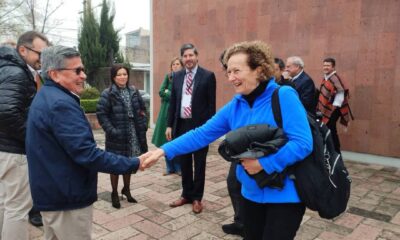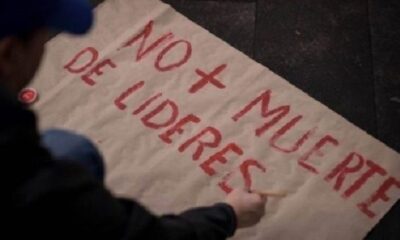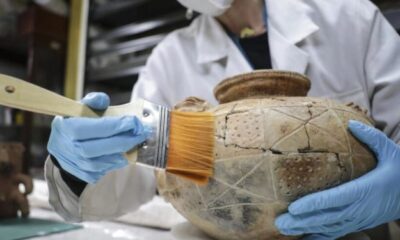International
Asking for permission to enter the house: the demand of Colombian indigenous people against Mennonites
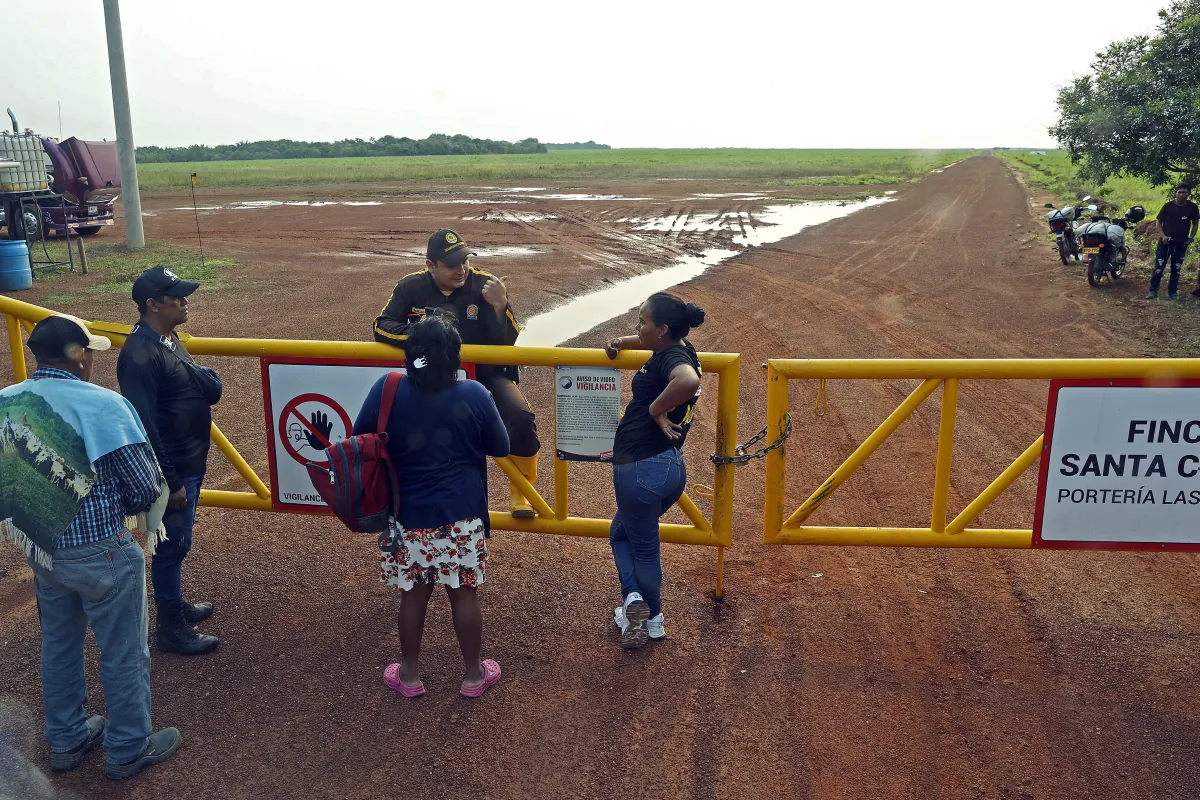
“Yesterday they returned us,” say the Sikuani indigenous authorities in front of the barrier that prevents them from entering their homes, waiting for authorization to continue, and denounce that their ancestral lands, in the Colombian department of Meta, are now owned by third parties who, they say, bought them irregularly.
On the Santa Catalina farm, owned by the meat company La Fazenda, they receive a refusal to pass by the entourage of journalists that accompanies them; they try their luck with the other entrance, that of the Mennonite ultra-religious community, which does authorize them to pass.
“Our grandparents are buried here,” says Jairo Ortiz in front of one of the sacred sites of the Sikuani, now in Mennonite territory.
“In times of violence they left here, they did not sell the land to anyone and left them thrown away, at that time other people who are not indigenous arrived and they took over,” says the captain, a position of authority of this semi-nomadad people displaced in several episodes of Colombian history.
In the Meta they lived until the so-called period of “violence”, which began in 1946, when they had to flee to the neighboring departments of Vichada and Guaviare. Then they returned but came back to persecution with the “guahibiadas” and “jaramilladas”, terms used to refer to the hunts of indigenous people to displace them from their lands and seize them.
A few years ago they returned to the land of their ancestors when the Colombian conflict lowered its intensity, but they realized that theirs was now in the hands of others, including the ultra-religious Mennite community that, coming from Mexico, found the promised land in the Colombian Oriental Plains.
The problem of land in Colombia is one of the great debts of the State; it is very difficult to know whose property each property is because many territories are not entitled.
Now, the 135 Sikuani families of this settlement claim their lands and denounce their appropriation and accumulation by foreigners.
The Mennonites, when they saw the potential of the Meta, hired a lawyer who advised them on the purchase of land, so “in principle” they are legal, explains Diana Quintero, a lawyer of the National Commission of Indigenous Territories, who accompanies the Sikuani in their lawsuit, explains to EFE.
The problem comes when the titles that the Mennonites bought are analyzed, awarded by the state National Land Agency because they were vacant of the nation.
The rule says the wastelands have to remain in the hands of their owner for a certain time, but those who were sold to the religious community did not meet this deadline and the indigenous peoples were not taken into account.
Another alleged irregularity, Quintero continues, is that the allocation of vacant lots has a limit of hectares, something called the Family Agricultural Unit (UAF), and the owners of these lands acquired more than allowed by law, incurring hoarding.
Quintero maintains that the Mennonites hoard because “although they say they are different families, they are part of a nucleus” and link all their lands in the same production process, exceeding the legal limit of UAF.
“Two years ago the Mennonites began to enter little by little. He could not be told anything because they have someone who supports them,” explains Alexander Álvarez, governor of the Iwitsulibo community, which brings together 80 families, in reference to the alleged alliances of the religious community.
According to the indigenous people, in the area there is the presence of paramilitaries of the Gaitanist Self-Defense of Colombia (AUC), allied with the Mennonites to provide them with security. They travel with motorcycles without a license plate and do not identify themselves, while all the Sikuani authorities report having received threats for their demands.
The Sikuani demand a total of 58,000 hectares to be distributed among the four communities and ask for a receipt to be made. Tsabilonia is the community that is closest to getting its claims, since it has been awarded – pending formalization – a territory in extinction of domain that belonged to drug traffickers, but they demand more hectares.
At the entrance of Tsabilonia the difference in the use of the land made by both communities is visible: on the Mennonite side there is not a single tree, only hectares waiting to be cultivated, and on the Sikuani side, pasture and native vegetation.
“They are pressuring us, we are being contaminated by foreign Mennonites who come from Germany, Canada and Mexico,” denounces Albarrubiela Gaitán, the traditional authority of the Barrulia territory: “We want to be calm in our territory, cultivating our uses and customs because as indigenous people we need our motherland to live in peace and freedom.”
The plantings of the Mennonites arrive almost at the door of the house of Albarrubiela; for the moment, the religious community continues to expand the agricultural border while the Sikuani expect the Colombian Justice to issue a decision on a land that went from hope to dispute.
International
Spain’s irregular migrant population rises to 840,000, study finds
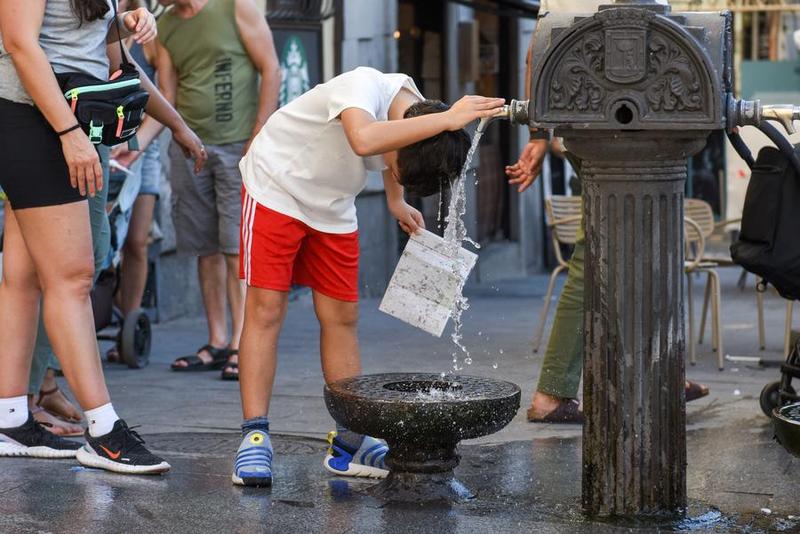
The number of migrants living in Spain without legal residency status continues to rise and has reached 840,000 people, with 91% originating from the Americas, particularly Colombia, Peru and Honduras, according to a report by the Spanish think tank Funcas (Foundation of the Savings Banks).
An estimated 17.2% of the non-EU foreign population living in Spain is in an irregular administrative situation. The estimate is based on the gap between the number of foreign residents effectively living in Spain, according to the National Statistics Institute (INE), and those who hold a residence permit, benefit from international protection, or are in the process of obtaining it.
The data, as of January 1, 2025, point to a notable and sustained increase in irregular migration since 2017, when the estimated figure stood at around 107,000 people, representing 4.2% of the non-EU population residing in Spain.
By origin, migrants from the American continent stand out, totaling around 760,000 people, or 91% of all irregular migrants. Colombians account for nearly 290,000, followed by Peruvians with almost 110,000, and Hondurans with about 90,000. Migrants from Africa (50,000), Asia (15,000) and Europe (14,000) trail far behind.
The figures predate Spain’s latest immigration regulation reform, which came into force in May 2025 and introduces measures to ease access to legal status through residency ties. According to Funcas, the reform would, in principle, tend to reduce the number of migrants in an irregular situation.
International
Historic snowstorm paralyzes Toronto after 60 centimeters of snow

Toronto, Canada’s largest city and the fourth most populous in North America, was largely paralyzed on Monday after a historic snowstorm dumped up to 60 centimeters of snow and sent temperatures plunging to -15 degrees Celsius, authorities said.
Late Sunday, as the scale of the snowfall became clear, city officials declared a climate emergency, triggering extraordinary measures including parking bans on several major streets to facilitate snow removal operations.
Toronto’s public transit authority reported that while some buses remain immobilized, subway and streetcar services are operating with relative normality, though localized disruptions may occur.
A similar situation is affecting the city’s commuter rail network, which remains operational but is experiencing significant delays on its main routes due to the severe weather conditions.
International
Venezuela frees at least 80 political prisoners, NGO says
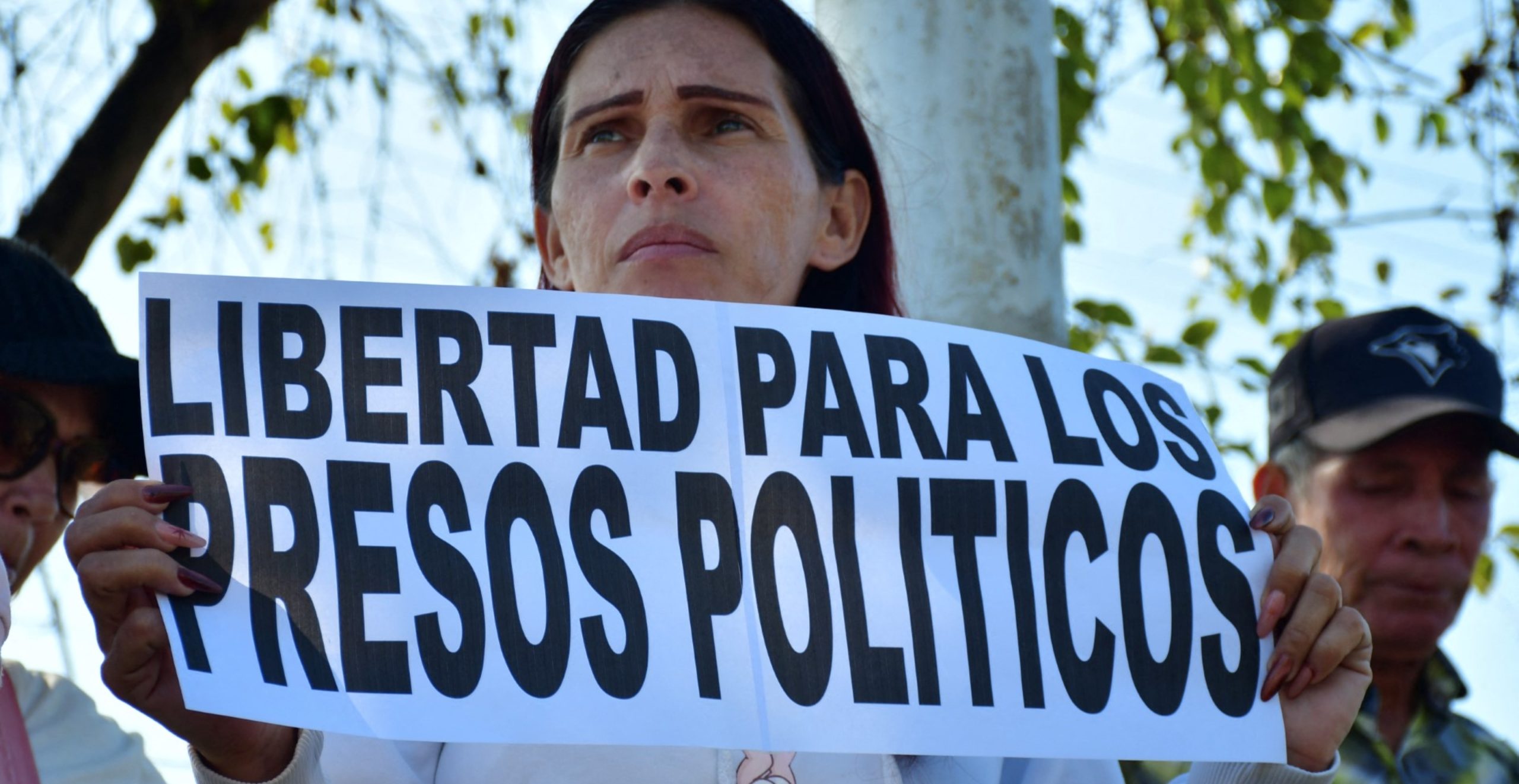
At least 80 political prisoners were released on Sunday across Venezuela, human rights group Foro Penal reported, as the broader process of detainee releases continues at a slow pace under the interim government.
Foro Penal’s director, Alfredo Romero, wrote on social media platform X that verified releases took place nationwide and that the figure could rise as more confirmations are completed.
Attorney Gonzalo Himiob, also from Foro Penal, said the excarcelations occurred during the early hours of the day and emphasized that the number is not yet final pending further verification.
The releases are part of a series of steps announced by Venezuela’s interim leader, Delcy Rodríguez, who took power after the capture of former President Nicolás Maduro in a U.S. military operation on Jan. 3, 2026. Rodríguez has pledged a significant number of liberations but has been criticized by opposition groups and rights organizations for the slow and nontransparent nature of the process.
So far, the Venezuelan government reports that 626 detainees have been freed since December, though independent counts by human rights groups suggest the number of actual political prisoner releases is lower and that many remain behind bars.
Families of those still detained have maintained vigils outside prisons, hopeful for further releases even as broader concerns about political imprisonment and due process persist.
-

 International5 days ago
International5 days agoMexican influencer “La Nicholette” kidnapped in exclusive area of Culiacán
-

 International4 days ago
International4 days agoTrump to invite Venezuela’s interim president Delcy Rodríguez to Washington
-

 Central America4 days ago
Central America4 days agoMazatenango Carnival cancelled amid State of Siege in Guatemala
-

 International5 days ago
International5 days agoMajor winter storm to blanket U.S. and Canada with snow, ice and arctic cold
-

 International4 days ago
International4 days agoMarkets rise as Trump halts Europe tariffs and floats Greenland agreement framework
-
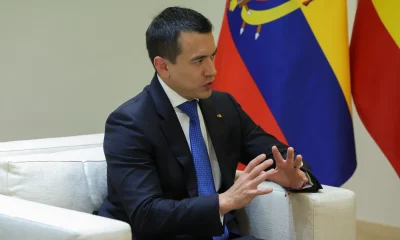
 International5 days ago
International5 days agoColombia slams Ecuador’s 30% tariff as ‘economic aggression’
-

 International5 days ago
International5 days agoTrump announces preliminary NATO agreement on Greenland, suspends tariffs on Europe
-

 International4 days ago
International4 days agoVenezuela’s interim president predicts 37% increase in revenues for 2026
-

 Internacionales3 days ago
Internacionales3 days agoMajor winter storm threatens “catastrophic” ice and snow across much of the U.S.
-

 International2 days ago
International2 days agoTrump-Era Defense Plan Prioritizes Border Security and Scales Back Global Commitments
-

 International4 days ago
International4 days agoJapan reopens Kashiwazaki-Kariwa Plant despite public concerns
-

 International4 days ago
International4 days agoFour minors killed in deadly clash between FARC dissidents in Colombia’s Amazon
-

 Central America3 days ago
Central America3 days agoGuatemala’s president rules out negotiations with inmates after prison riots
-

 International3 days ago
International3 days agoGuatemala considers sending high-risk gang members to military prisons
-

 International2 days ago
International2 days agoBogotá and Quito Seek Dialogue After Tariffs and Power Cut Escalate Tensions
-
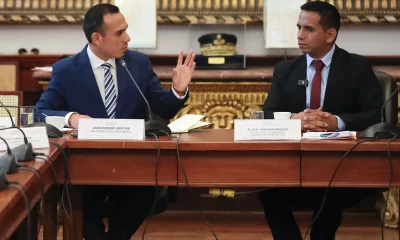
 International5 days ago
International5 days agoJosé Jerí claims destabilization attempt after videos of secretive meetings surface
-

 International1 day ago
International1 day agoDelcy Rodríguez seeks political agreements after Maduro’s ouster
-

 International3 days ago
International3 days agoRights group says over 5,000 killed in Iran protests, mostly civilians
-

 International1 day ago
International1 day agoFederal immigration agents kill man in Minneapolis, sparking protests and outrage
-

 International46 minutes ago
International46 minutes agoEU launches new probe into X over AI-generated fake nude images
-

 International44 minutes ago
International44 minutes agoVenezuela frees at least 80 political prisoners, NGO says
-

 International1 hour ago
International1 hour agoFrance debates ban on social media for children under 15
-

 Central America49 minutes ago
Central America49 minutes agoGuatemala seizes over a ton of cocaine hidden in flour at Pacific port
-

 International34 minutes ago
International34 minutes agoSpain’s irregular migrant population rises to 840,000, study finds
-

 International1 hour ago
International1 hour agoSevere winter storm grips U.S., leaves multiple dead as extreme cold persists
-

 International51 minutes ago
International51 minutes agoRights group says nearly 6,000 killed in Iran protest crackdown
-

 International35 minutes ago
International35 minutes agoHistoric snowstorm paralyzes Toronto after 60 centimeters of snow





































